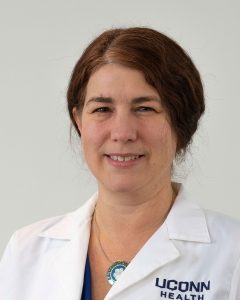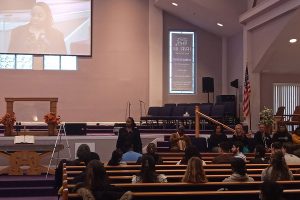More than 100 members of the UConn School of Medicine Class of 2027 have a fresh perspective they’ll be able to apply as physicians: that of members of a community that historically struggles with health disparities.
In a Hartford neighborhood known as the North Hartford Promise Zone, at the Phillips Metropolitan CME Church Jan. 26, heard first-hand accounts of residents’ experiences with health equity challenges.

An “opportunity for community-informed learning” is how Dr. Kirsten Ek, assistant professor of medicine and the school’s course director, describes it.
“In this symposium, leaders from around the community generously shared their knowledge and vision with our students for how we can collaborate to close the unacceptable life expectancy gap that exists in North Hartford compared to surrounding neighborhoods,” Ek says. “By learning directly from our community and its leaders, we better inform the care our training physicians provide.”
Stefan Marczuk is the class representative and helped organize the symposium.
“Speaking with community members about ongoing initiatives in North Hartford was a great way to engage with our partners in health equity as students,” Marczuk says. “This opportunity to learn about the factors that threaten our patients’ health and the goals we can support to improve resident longevity helped me understand how I can help advocate for change outside the classroom now, and outside the clinic in the future.”
Learning objectives included analyzing how where people live and the social determinants of health they face can impact life expectancy, and identifying protective factors and threats to health equity and longevity in a vulnerable community.
“As a medical student who is not from Connecticut or the Hartford area, I enjoyed learning about different nonprofits and outreach programs that I connect my current and future patients to,” says classmate Katrina Jackson.
Adds fellow first-year student Ana Rive, “It was inspiring to hear about the organizations helping link patients to resources at the community level and advocate for change at the institutional level, and how I can do my part to help as a future physician.”

The panelists included community stakeholders and residents seeking to address disparities that lead to health outcomes that compare unfavorably to peers in other neighborhoods and nearby towns.
- Simon Abi-Saleh, general internal medicine fellow, Department of Medicine, UConn Health, and Internal Medicine Health Equity Track leader
- Rebekah Castagno, director of health initiatives, United Way of Central and Northeastern Connecticut
- Emil Coman, assistant professor, UConn Health Disparities Institute
- Gabrielle Emmanuel, community resource center manager, Urban League Greater Hartford
- Violette Haldane (and her students), Advocacy to Legacy, Inc. and West Indian Foundation, Inc.
- Chavon Hamilton-Burgess; founder, executive director, Hartford Health Initiative
- Denise Holter, chair, Community Action Task Force, Hartford Health Hub
- David J. Hopkins; president and CEO, Urban League of Greater Hartford
- Allyson McGinty; director of strategic partnerships, United Way of Central and Northeastern Connecticut
- Sharon Mierzwa, program manager; Hartford Health and Human Services
- Christopher Prescott, board member, Donate Life Connecticut; and founder/president and executive director of MPact Mentoring Inc.
- Shayla Ranmal-Suppies, Maternal and Child Health Division, Hartford Health and Human Services
- Amos Smith; member of Health Equity Collaborative, sponsored by the CT Health Foundation, and president and CEO, Community Action Agency of New Haven, Inc.
- Dennis Thomas; author, heart transplant survivor, basketball coach, community mentor
- Lindsay Vigue; director, Donate Life Connecticut, and living kidney donor
- Nana Yaa A. Marfo, postdoctoral fellow, Mental Health Services Research Implementation Science and Practice Advances Research Center (iSPARC), UMass Chan Medical School, Department of Psychiatry, and clinical psychology fellow, UMass Memorial Health
“We thank our impressive panelists for the gift of their time and wisdom for our medical trainees,” Ek says. “We thank the Phillips Metropolitan CME Church’s health ministry team for graciously hosting us, the local restaurant Hot Pots for providing delicious food, and we thank moderators Mr. Courtenay Jackson, director, North Hartford Promise Zone, Office of the Mayor, who discussed place-based initiatives to support North Hartford, and Ms. Angela Harris, chair, Phillips Health Ministry, and Neighborhood Revitalization Zone resident liaison, Health and Wellness Initiative, representing Northeast, Clay Arsenal and Upper Albany neighborhoods, who provided closing comments around achieving health equity for this vibrant community.”


